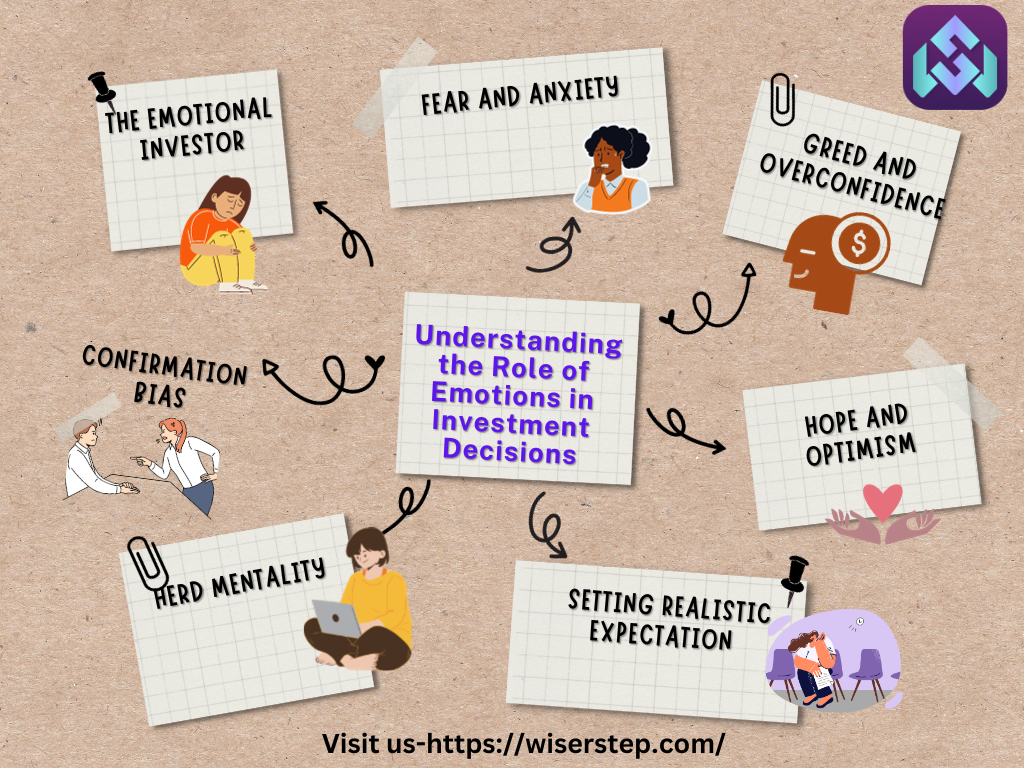Investing is often considered a rational and analytical endeavor, guided by market trends and financial data. However, the human element—our emotions plays a significant role in shaping investment decisions. Understanding the influence of emotions on investing is crucial for making informed and effective financial choices.
The Emotional Investor
Emotions are an inherent part of the human experience and can significantly impact our decision-making process, even in financial matters. When it comes to investing, emotions like fear, greed, hope, and excitement can strongly influence how we perceive risks and opportunities.
Fear and Anxiety
Fear of loss is a prevalent emotion among investors. When markets fluctuate or there’s negative news, fear can drive impulsive decisions, leading to selling assets hastily or avoiding investments altogether.
Greed and Overconfidence
Conversely, feelings of greed and overconfidence can lead to excessive risk-taking. During market booms, investors might overlook warning signs or overestimate their ability to predict market movements, resulting in inflated expectations and risky investments.
Hope and Optimism
Hope and optimism can influence investors to hold onto losing positions, expecting a turnaround. While optimism is valuable, unrealistic expectations can hinder rational decision-making.
Emotions vs. Rationality in Investing
In an ideal scenario, investment decisions would be solely based on careful analysis and rational thinking. However, emotions often overpower logic, affecting the decision-making process.
Loss Aversion
Psychologically, the pain of losing money is more impactful than the joy of gaining the same amount. This phenomenon, known as loss aversion, can lead investors to make irrational decisions, like holding onto losing investments for too long.
Herd Mentality
Human beings are social creatures, and in investing, this translates to the herd mentality. Seeing others buying or selling stocks can influence individual decisions, often leading to market bubbles or crashes driven by collective emotions.
Confirmation Bias
Investors tend to seek information that confirms their existing beliefs while disregarding contradictory data. This bias can reinforce emotional decisions and limit a holistic view of investment opportunities.
Managing Emotions in Investing
While emotions are unavoidable, successful investors learn to manage and mitigate their impact on decision-making.
Education and Research
Understanding market trends, conducting thorough research, and staying informed can provide a rational basis for investment decisions, reducing the influence of emotions.
Establishing a Plan and Diversification
Having a well-defined investment plan helps in sticking to long-term goals and reducing impulsive actions. Diversification across various asset classes can also cushion against emotional reactions to market volatility.
Setting Realistic Expectations
Realistic expectations about returns and acknowledging the possibility of losses can temper emotions and prevent impulsive decisions driven by greed or fear.
Discipline and Patience
Maintaining discipline and resisting the urge to react to short-term market fluctuations are essential. Patience allows investments to grow and minimizes the impact of emotional reactions.
Technology and Emotional Investing
Advancements in technology have introduced tools and platforms aimed at minimizing emotional influences in investing.
Robo-Advisors and Algorithms
Robo-advisors use algorithms to automate investment strategies based on predefined criteria. By removing human emotions from the equation, these platforms aim to create more objective and systematic investment plans.
Behavioral Finance Tools
Some financial apps and platforms integrate behavioral finance principles, providing insights into emotional biases. They offer personalized recommendations and nudges to help investors make more informed decisions.
Recognizing the role emotions play in investment decisions is fundamental to becoming a successful investor. While emotions cannot be eliminated entirely, being aware of their influence and implementing strategies to manage them is crucial.
Successful investing requires a balance between rational analysis and emotional control. It’s about acknowledging emotions, understanding their impact, and leveraging strategies and tools to make informed decisions that align with long-term financial goals.
By mastering the ability to navigate emotions in investing, individuals can become more resilient, disciplined, and ultimately, more successful in achieving their financial aspirations.

